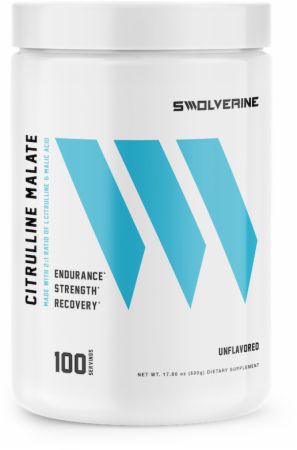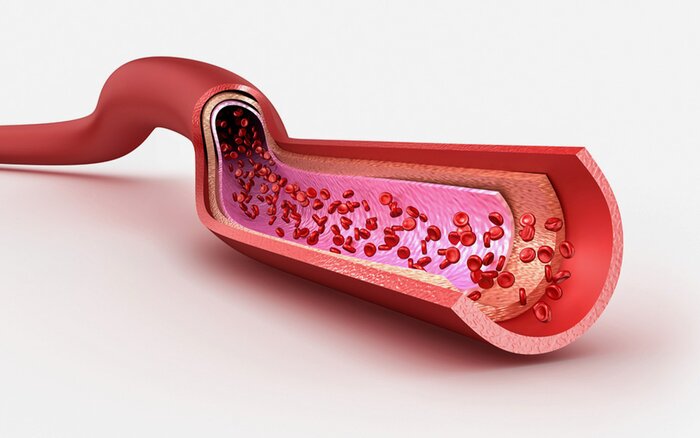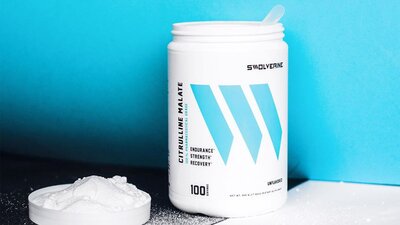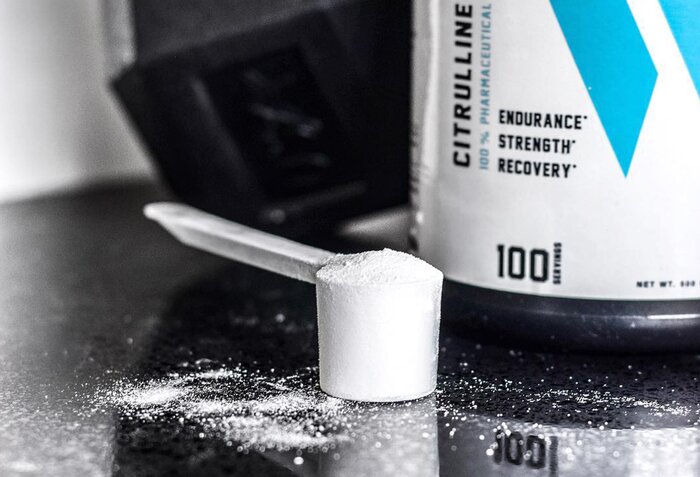Wouldn't it be great to perform an entire workout with less muscle fatigue? You could easily complete more reps (probably in less time), you would gain more muscle, and your endurance would skyrocket.
There's a supplement that can help you do just that. Citrulline malate is a unique combination of the nonessential amino acid L-citrulline and malic acid. L-Citrulline is most commonly found in watermelons, while malate gets its name from the Latin word for "apple." Citrulline malate has a long history of use in sports nutrition, but we know more now than ever before about its biochemistry and how it works.
You can get L-citrulline naturally in your diet. The human body also manufactures it from another amino acid, l-ornithine, through the urea cycle, a biochemical process that helps the body rid itself of ammonia, a waste product of protein digestion. Citrulline enters this cycle of nitrogen disposal to create more arginine, which helps generate greater volumes of nitric oxide. Consuming arginine directly isn't quite as effective due to enzyme activity in the gut neutralizing arginine before it can be put to good use. Citrulline malate supplements raise ornithine and arginine plasma content, which improves the ammonia recycling process and nitric oxide synthesis.
Here's a rundown of the many benefits this supplement has to offer for hard-training athletes:
Benefit 1: Citrulline Malate Helps Reduce Muscle Fatigue While Increasing Endurance*
Citrulline malate can help delay muscle fatigue by promoting increased aerobic energy.* In a study published in the British Journal of Sports Medicine, 6 grams of citrulline malate, taken daily, reduced muscle fatigue by sparking a 34 percent increase in oxidative ATP production during exercise. The same study found a 20 percent increase in phosphocreatine recovery after exercise, indicating a greater oxidative ATP synthesis contributing to energy production.[1]
While these results were found in a small group of sedentary subjects, it's possible they may apply to elite athletes, as well.*
Benefit 2: Citrulline Malate Helps Relieve Muscle Soreness and Improve Recovery*
Like fatigue, muscle soreness can interrupt a workout. It can also cause a lot of physical discomfort, especially in the day or two after a workout. Citrulline malate has been shown to reduce this post-workout muscle soreness.*
In a study conducted at the University of Córdoba, Spain, and published in The Journal of Strength and Conditioning Research, lifters who took 8 grams of citrulline malate during bench press workouts showed a 40 percent reduction in muscle soreness—both at 24 and 48 hours—over lifters who didn't take citrulline malate.[2] Reduced muscle soreness also can translate into reduced time between workouts, improving outcomes over the long run.*
Benefit 3: Citrulline Malate Leads to Strength Gains*
Citrulline malate has shown significant benefits in increasing strength through different mechanisms. A 2019 meta-analysis published in Sports Medicine indicated improved strength outcomes across a wide range of studies.* [3]
While the effect was modest and mostly focused on elite athletes, it should not be ignored. Potential mechanisms include enhanced ammonia removal, enhanced energetics through increased malic acid, and improved recovery due to increased blood flow enhanced by nitric oxide.*

Benefit 4: Citrulline Malate Enhances Nitric Oxide Production*
One of the biggest benefits of citrulline malate is its ability to influence nitric oxide production through a rise in plasma L-arginine levels. Nitric oxide is a vasodilator, meaning it causes blood vessels to widen, increasing blood flow and circulation without increasing blood pressure. That means better muscle repair, faster recovery, and improved movement of nutrients to muscles in need.*[4]

Benefit 5: Citrulline Malate Facilitates Protein Synthesis*
The increased L-arginine from taking citrulline malate also aids protein synthesis.* A pilot study from 2015 showed improved muscle protein synthesis when citrulline was given alongside amino acids instead of just amino acids alone.
The subjects had been on a low protein diet leading up to the test, so it's unclear if citrulline improves protein synthesis in athletes already consuming high-protein foods.*[5]
Benefit 6: Citrulline Malate Helps the Body Make Better Use of Essential Amino Acids During Extremely Strenuous Exercise*
In a study published in the European Journal of Applied Physiology, 17 amateur male cyclists were administered 6 grams of citrulline malate or a placebo two hours prior to participating in a 137-kilometer cycling stage. Post-exercise blood tests showed decreased plasma concentrations of essential amino acids but increased concentrations of nonessential aminos in those who had gotten the citrulline.[6] The authors concluded that the cyclists who consumed citrulline were able to use more essential amino acids (mainly branched-chain amino acids) as fuel during the intense bout.*
Citrulline malate also significantly increased the plasma concentrations of citrulline, arginine, ornithine, urea, creatinine, nitrite, and growth hormone within normal ranges.*
A couple things to note here. Normally, the body does not go straight to consuming amino acids for energy. Carbohydrates and fat are much easier and healthier to convert to ATP. Only when other energy stores are near depleted does metabolism shift toward amino acids. Also, it is not recommended to make a habit of entering this exhaustive catabolic state. Over time, it could negatively affect lean body mass. It is good to know, though, that if an athlete needs to push that hard, taking citrulline can provide the extra energy from amino acids.*
The Bottom Line
If you want to increase your training volume and endurance, adding citrulline malate to your supplement stack can help you reach your goals. With greater training volume, your gains in strength and endurance will compound over time, increasing overall athletic performance.*
*These statements have not been evaluated by the Food and Drug Administration. These products are not intended to diagnose, treat, cure, or prevent any disease.
References
- Bendahan D., Mattei, J. P, Ghattas, B., et al, (2002). Citrulline/malate promotes aerobic energy production in human exercising muscle. British Journal of Sports Medicine, 36, 282-89.
- Pérez-guisado J., & Jakeman, P. M. (2010). Citrulline malate enhances athletic anaerobic performance and relieves muscle soreness. The Journal of Strength and Conditioning Research, 24(5):1215-22.
- Trexler, E. T., Persky, A. M., Ryan, E. D., Schwartz, T. A., Stoner, L., & Smith-Ryan, A. E. (2019). Acute effects of citrulline supplementation on high-intensity strength and power performance: a systematic review and meta-analysis. Sports Medicine, 49(5), 707-718.
- Ochiai, M., Hayashi, T., Morita, M., Ina, K., Maeda, M., Watanabe, F., & Morishita, K. (2012). Short-term effects of L-citrulline supplementation on arterial stiffness in middle-aged men. International Journal of Cardiology, 155(2), 257-261.
- Jourdan, M., et al. (2015). Citrulline stimulates muscle protein synthesis in the post-absorptive state in healthy people fed a low-protein diet—a pilot study. Clinical Nutrition, 34(3), 449-456.
- Sureda, A., Córdova, A., Ferrer, M. D., Pérez, G., Tur, J. A., & Pons, A. (2010). L-citrulline-malate influence over branched chain amino acid utilization during exercise. European Journal of Applied Physiology, 110(2), 341-51.

.png)

